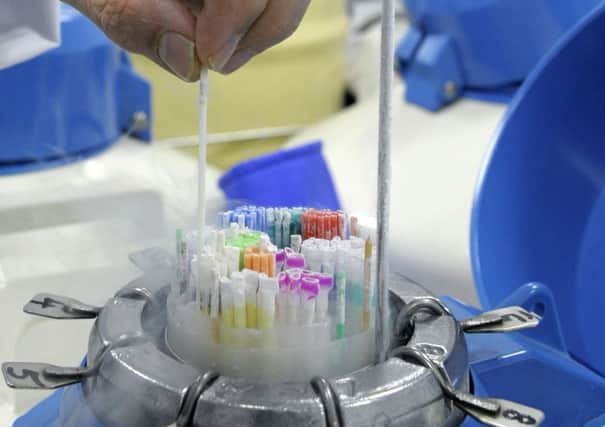Early success for Scottish ‘egg bank’


The service, which opened at the private Glasgow Centre for Reproductive Medicine (GCRM) last month, has already celebrated success after a patient in her forties became pregnant.
Many women over the age of 35 struggle to conceive naturally and IVF treatment with their own eggs has a low success rate – 13.6 per cent in the 40-42 age group which drops to 1.9 per cent in the 45+ range – according to the Human Fertilisation and Embryology Authority (HFEA) which regulates all fertility centres in the UK.
Advertisement
Hide AdAdvertisement
Hide AdThe bank builds up its store by collecting eggs that a donor has produced but have not been needed by the older couple requiring treatment.
Waiting times for donor eggs can be long in the UK, and many Scots have gone abroad for treatment – often to Spain.
However, HFEA found that waiting times have been cut since the compensation fee for egg donors increased to £750, leading to more donations.
Dr Marco Gaudoin, medical director of the GCRM, said egg donors were either “altruistic” women who had completed their families and wanted to donate their eggs or “sharers” – younger women who were struggling to get pregnant and had chosen to give up some of their eggs in order to receive a discount on their IVF treatment.
He added: “We currently have 20 batches of stored eggs. As these are utilised, we replenish the bank by adding eggs from sharers and altruistic donors.
“These donors are increasing now, due in part to the fact that we can reimburse them. However, we have 90 patients who require donated eggs.”
The GCRM also helps around 50 Scottish couples a year who currently travel to a partner Spanish IVF clinic.
IVF with donor eggs is currently available on the NHS but waiting lists are long.
Advertisement
Hide AdAdvertisement
Hide AdThe procedure at GCRM costs between £5,000 and £8,000, with a success rate per cycle of 35 per cent to 50 per cent.
Donated eggs are vitrified – the embryo is exposed to a solution and frozen before being thawed and implanted into the uterus or frozen and held in storage for recipients who are able to choose donor characteristics as they currently do with sperm donation.
Additionally, recipients can decide when they are thawed, fertilised and transferred.
Dr Gaudoin said the number of women who will receive donor eggs this year at his clinic is expected to double.
“It’s well known that women are putting off having a family until later in their lives and I think we are going to see this trend continue”, he said.
Helen Anderson, a spokeswoman for the patient support group Cradle, said the egg bank was a welcome development.
She said: “Having IVF is stressful enough without the added pressure of having to go abroad for egg donation.
“If more women can have IVF with donor eggs in Scotland, I think that is a good thing. However, I don’t think it should be used by women as a reason to put off having children when they are in their twenties and early thirties.”
Advertisement
Hide AdAdvertisement
Hide AdLast year, a report by the Royal College of Midwives found Scotland had the fastest growing number of women in their forties in the UK having babies.
Its third annual State of Maternity Services report found the number of women giving birth aged between 40 and 44 in Scotland rose by 71 per cent from 2001 to 2012. Births among women aged 45 and over increased from 40 in 2001 to 106 by 2012. A Scottish Government spokesman said: “We recognise a shortage of egg donors is an issue across Scotland and the rest of the UK and are working to address this.
“We have set up an expert group to look at the challenges and set out a way forward for NHS provision of both egg and sperm donation in Scotland.”